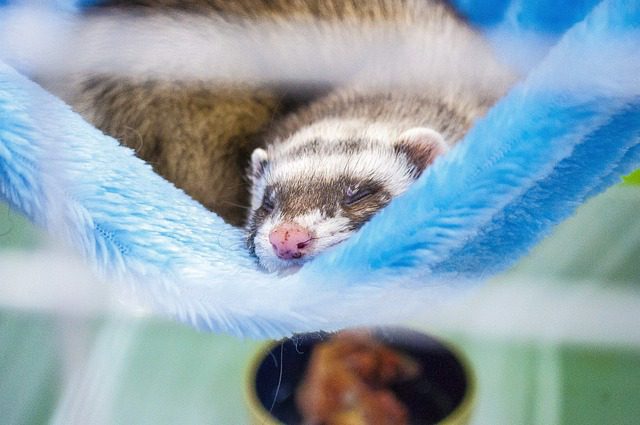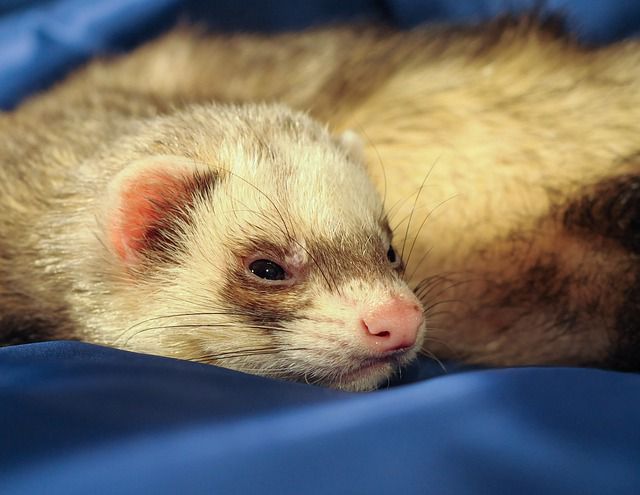12 Common Health Problems In Ferrets With Remedies

Today, we’re diving into the fascinating world of health problems in ferrets. From adrenal gland disease to insulinoma, ferrets can face their fair share of health problems.
But fret not, because, in this article, we’ll explore common issues, share tips for prevention, and ensure your little bundles of joy stay happy and healthy.
So, let’s jump right in!
Common Health Problems In Ferrets
Ferrets can be prone to several health problems. One common issue is adrenal gland disease, which can cause hair loss, itching, and weight gain.
Another concern is insulinoma, a condition where the pancreas produces too much insulin, leading to low blood sugar levels. Ferrets are also susceptible to gastrointestinal problems like blockages and ulcers.
Regular veterinary check-ups and a balanced diet can help prevent and manage these health issues in ferrets.
Let’s dive deeper…
The following are some of the most common health problems in ferrets:
1. Ferret Adrenal Gland Disease
Ferret adrenal gland disease is a common health problem in ferrets, primarily affecting middle-aged to older individuals.
It occurs due to the overgrowth of the adrenal glands, which are located near the kidneys. The exact cause is still uncertain, but hormonal imbalances and genetic factors are believed to play a role.
Prevention of ferret adrenal gland disease is challenging, but spaying or neutering ferrets at an early age can reduce the risk.
Symptoms of this disease include hair loss, itching, increased aggression, and enlarged adrenal glands.
Treatment options for ferret adrenal gland disease include surgical removal of the affected glands or medical management using medications like hormone implants or medications that suppress hormone production.
Regular veterinary check-ups and monitoring are crucial for managing this condition effectively. Early detection and intervention can improve the quality of life for affected ferrets.
2. Ferret Insulinoma
Insulinoma is a common health problem in ferrets, characterized by the development of tumors in their pancreas that produce excessive levels of insulin.
These tumors are usually malignant and can lead to low blood sugar levels, a condition known as hypoglycemia.
The exact cause of insulinoma in ferrets is not fully understood, but genetics and diet are believed to play a role.
To prevent insulinoma, it is important to feed ferrets a balanced diet that is low in simple carbohydrates and high in protein. Regular veterinary check-ups are also crucial for early detection and treatment.
Symptoms of insulinoma in ferrets include lethargy, weakness, seizures, drooling, and weight loss. If left untreated, insulinoma can be life-threatening.
Treatment options include surgery to remove the tumors, medications to manage blood sugar levels, and dietary modifications.
3. Gastrointestinal Problems
Gastrointestinal problems are common health issues in ferrets. They can occur due to various factors such as dietary changes, stress, or bacterial infections.
To prevent gastrointestinal problems, it is crucial to provide a balanced diet high in animal protein and fiber, avoid sudden dietary changes, and maintain a clean and stress-free environment for the ferret.
Symptoms of gastrointestinal problems in ferrets may include diarrhea, lack of appetite, weight loss, and abdominal pain. If these symptoms occur, it is important to seek veterinary care promptly.
Treatment options for gastrointestinal problems in ferrets may include medication to address bacterial infections or parasites, fluid therapy to prevent dehydration, and dietary modifications to support digestive health.
4. Ferret Dental Disease
Ferret dental disease is a common health problem in ferrets that affects their oral health. It occurs due to the buildup of plaque and tartar on their teeth, leading to gum inflammation and tooth decay.
Symptoms of dental disease in ferrets include bad breath, difficulty eating, drooling, and swollen gums.
Treatment options for ferret dental disease involve professional dental cleanings under anesthesia to remove plaque and tartar. In severe cases, tooth extraction may be necessary.
Regular tooth brushing at home can help prevent dental disease in ferrets. It is important to use a toothbrush and toothpaste specifically designed for ferrets.
To prevent dental disease, it is crucial to provide a balanced diet that includes crunchy foods to help naturally clean their teeth.
Avoid giving them sugary treats or soft food that can stick to their teeth. Regular veterinary check-ups are also important to catch any dental issues early on.
5. Inflammatory bowel disease
Inflammatory bowel disease (IBD) is a common health problem in ferrets that affects their digestive system. It occurs when there is chronic inflammation in the lining of the intestines. Symptoms of IBD in ferrets include diarrhea, weight loss, decreased appetite, and vomiting.
Treatment options for IBD in ferrets may include dietary changes, such as a low-fiber diet, and medication to reduce inflammation, such as corticosteroids. In severe cases, surgery may be necessary to remove affected parts of the intestines.
To prevent IBD in ferrets, it is important to provide them with a balanced diet that is high in protein and low in fat. A
void feeding them excessive amounts of treats or human food can disrupt their digestive system. Regular veterinary check-ups and monitoring of their overall health can also help detect and manage IBD early on.
6. Skin Infections
Skin infections are a common health problem in ferrets and can occur due to various factors. These infections can be caused by bacteria, fungi, or parasites.
Symptoms of a skin infection in ferrets may include redness, itching, hair loss, scabs, and the presence of pus or discharge.
Treatment options for skin infections in ferrets typically involve topical or oral medications, such as antibiotics or antifungals, depending on the underlying cause. It is important to consult a veterinarian for an accurate diagnosis and appropriate treatment plan.
To prevent skin infections in ferrets, it is important to maintain proper hygiene by regularly cleaning their cages and bedding. Avoid overcrowding and ensure a clean environment. Regular grooming, including brushing and bathing, can also help prevent skin infections.
Providing a balanced diet and ensuring proper nutrition is also crucial for maintaining a healthy immune system in ferrets, which can help prevent skin infections.
7. Ferret Influenza
Ferret influenza, also known as ferret flu, is a health problem that affects ferrets. It is caused by the influenza virus, specifically the H1N1 strain. Symptoms of ferret influenza include fever, coughing, sneezing, nasal discharge, and lethargy.
Treatment options for ferret influenza primarily involve supportive care, as there is no specific antiviral medication for ferrets.
This includes providing a warm and comfortable environment, ensuring hydration, and offering easily digestible food. It is important to consult with a veterinarian for guidance on specific treatment plans.
Preventing ferret influenza can be achieved through vaccination. Regular vaccinations against influenza are recommended for ferrets, as they can help reduce the severity and duration of the illness if they do contract the virus.
Additionally, practicing good hygiene, such as regular hand-washing and sanitizing ferret living areas, can help minimize the risk of transmission.
8. Parasites
Parasites can pose a significant health problem in ferrets. They can be contracted through various means, such as contact with infected animals or contaminated environments. Common parasites in ferrets include fleas, ticks, ear mites, and intestinal worms.
Symptoms of parasitic infestation in ferrets may vary depending on the type of parasite. Fleas and ticks can cause itching, hair loss, and skin irritation.
Ear mites can lead to excessive scratching, head shaking, and ear discharge. Intestinal worms may cause diarrhea, weight loss, and a dull coat.
Treatment options for parasitic infestations in ferrets typically involve medication prescribed by a veterinarian.
Flea and tick control products, ear drops for mites, and deworming medications are commonly used. It’s important to follow the veterinarian’s instructions and complete the full course of treatment.
Preventing parasitic infestations in ferrets involves regular hygiene practices. Regularly clean and disinfect the ferret’s living area, including bedding and toys.
Use appropriate flea and tick prevention products recommended by a veterinarian. Ensure proper hygiene and cleanliness when handling the ferret, and avoid contact with potentially infected animals.
By being vigilant about hygiene, regularly monitoring for signs of infestation, and seeking prompt veterinary care, ferret owners can help prevent and manage parasitic health problems in their beloved pets.
9. Heart disease
Heart disease is a significant health problem in ferrets, and it can occur due to various factors. One common cause is cardiomyopathy, a condition where the heart muscle becomes weak and enlarged.
Symptoms of heart disease in ferrets include coughing, difficulty breathing, decreased energy, and pale gums.
Treatment options include medication to manage symptoms and improve heart function. Preventing heart disease in ferrets involves providing a balanced diet, regular exercise, and a stress-free environment.
Regular veterinary check-ups are crucial to monitor the ferret’s heart health and catch any signs of heart disease early. By being proactive in their care, ferret owners can help prevent heart disease and ensure their furry friends live long and healthy lives.
10. Tumors and cancer
Tumors and cancer are a significant health problem in ferrets. These abnormal growths occur when cells divide and multiply uncontrollably.
Symptoms of tumors in ferrets vary depending on the type and location, but common signs include lumps, swelling, weight loss, and changes in behavior.
Treatment options for tumors in ferrets include surgical removal, chemotherapy, and radiation therapy. However, the success rate and prognosis depend on factors such as the type of tumor and its stage.
To prevent tumors in ferrets, it is crucial to provide a balanced diet, regular exercise, and minimize exposure to environmental carcinogens. Regular veterinary check-ups and early detection are also key in managing this health issue.
11. Ferret Distemper
Ferret distemper, also known as canine distemper virus (CDV), is a significant health problem in ferrets. It is a highly contagious viral disease that can be transmitted through respiratory secretions.
Symptoms of ferret distemper include fever, lethargy, loss of appetite, nasal and ocular discharge, coughing, and neurological signs such as tremors and seizures.
Treatment for ferret distemper is primarily supportive and aimed at managing the symptoms. This may include providing fluids, antibiotics to prevent secondary bacterial infections, and medications to control seizures or other neurological issues. However, there is no cure for distemper in ferrets, and the prognosis is often poor.
Prevention is crucial in combating ferret distemper. Vaccination is the most effective method to prevent the disease. Ferrets should receive a series of vaccinations starting at around 8 weeks of age, followed by boosters at regular intervals.
Additionally, maintaining good hygiene and minimizing exposure to potentially infected animals can help reduce the risk of transmission.
12. Ferret Aplastic Anemia
Ferret aplastic anemia is a rare but serious health problem in ferrets. It occurs when the bone marrow fails to produce enough red and white blood cells, leading to a compromised immune system.
This condition can be caused by genetic factors, exposure to certain toxins, or as a side effect of medications like chemotherapy.
Prevention is crucial, and it starts with providing a clean and safe environment for ferrets. Avoid exposure to toxic substances, such as cleaning agents or chemicals. Regular veterinary check-ups are essential to catch any potential issues early on.
Symptoms of aplastic anemia in ferrets include weakness, lethargy, loss of appetite, pale gums, and increased susceptibility to infections. If these symptoms are observed, immediate veterinary attention is necessary.
Treatment options for ferret aplastic anemia involve supportive care, including blood transfusions to replenish the blood cell counts and medications to stimulate bone marrow production. In severe cases, a bone marrow transplant may be considered.
Signs Your Ferret is Sick
Signs that your ferret may be sick include changes in appetite, weight loss, lethargy, and abnormal behavior.
If your ferret is not eating as usual or has lost weight, it could be a sign of an underlying health issue. Lethargy and a lack of energy are also red flags that something may be wrong with your ferret.
Additionally, if your ferret is displaying abnormal behavior such as excessive scratching, sneezing, or discharge from the eyes or nose, it’s important to seek veterinary attention as these could be signs of illness.
Read more about identifying a sick ferret.
Conclusion
In conclusion, it’s crucial to be aware of the potential health problems that ferrets may face.
By staying informed and proactive, we can ensure the well-being of our furry friends.
Remember, a little care goes a long way in keeping our ferret companions happy and healthy!

![Why Ferrets Bite [11 Reasons & Remedies] Why Ferrets Bite](https://petcreeks.com/wp-content/uploads/2023/10/ferret-1972523_640.jpg)
![Ferret Depression [Signs, Causes & Solutions] Ferret Depression](https://petcreeks.com/wp-content/uploads/2023/12/ferret-2194028_1280-768x510.jpg)
![How Do I Know If My Ferret Is In Pain [See 11 Signs] How Do I Know If My Ferret Is In Pain](https://petcreeks.com/wp-content/uploads/2023/12/ferret-660546_1280-768x576.jpg)


![How to Train a Ferret Not to Bite [Helpful Tips] How to Train a Ferret Not to Bite](https://petcreeks.com/wp-content/uploads/2023/12/istockphoto-177817907-612x612-1.jpg)